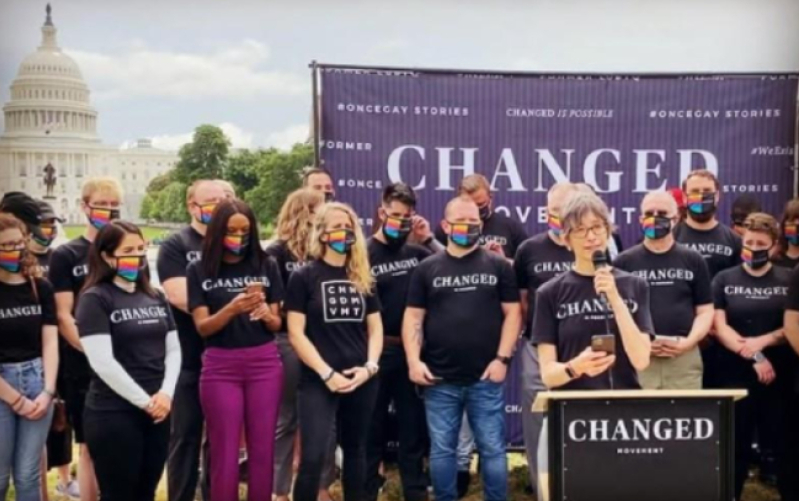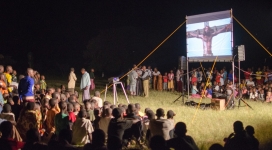
A recent article by Leung Hoi-yan, a research fellow with the Hong Kong Association for Sexual Culture, presents the perspective of Elizabeth Woning, a former lesbian who once believed that “homosexuality is not a sin.” Woning later came to recognize the flaws in that ideology and left the homosexual lifestyle behind.
In her twenties, Woning came out as a lesbian, supported queer theology, and even pastored among LGBTQ individuals. However, after encountering Jesus Christ, she left homosexuality and found true love in a heterosexual marriage. Her journey of healing changed her understanding of homosexual ideology, and today, she is committed to helping others who are struggling within the LGBTQ community. She also advocates for the legal protection of free speech for those who choose to leave the LGBTQ lifestyle.
Woning explains that many in the homosexual community believe “homosexuality is not a sin” because they view it as biologically natural. Since homosexual feelings are deeply felt, denying them is considered harmful. For a time, she supported homosexual Christians from this standpoint.
Though homosexual and transgender practices may seem unnatural to some, the LGBTQ movement argues that society's rejection stems from stigmatization. The slogan “love is love” claims that as long as love is present, the contradiction between soul and body doesn't matter. This forces society to prioritize subjective feelings, based on a dualistic worldview that separates soul from body.
Why Has Society Embraced LGBTQ in Just a Few Decades?
Woning observes that the shift in cultural norms, especially among younger generations, is largely due to the digital revolution and its promotion of a “virtualized self-awareness.”
She explains that when people express themselves emotionally and intellectually online, the transparency and perceived authenticity generate a sense of being “understood.” When these expressions receive affirmation, people interpret it as love. As the inner self seems more “real,” the physical body becomes secondary—an appendage of the soul. This body-soul dualism has deepened public empathy for LGBTQ theories.
Not All “Love” Is the Same
Woning contrasts this view with the Christian understanding of the human person: body and soul are inseparable. In a romantic relationship, heterosexual love involves not just emotional connection, but also the physical distinction between male and female. From hormones to brain structure, the male and female bodies are biologically designed to complement each other, resulting in fulfillment in both body and spirit through sexual union.
While the LGBTQ movement champions “love is love,” Woning, who has personally experienced same-sex relationships, asserts that homosexual and heterosexual love are not the same. “Most millennials and younger generations don’t recognize any real difference between same-sex and opposite-sex intimacy. For them, love and sex are mostly psychological experiences. But when we closely examine how same-sex love is physically expressed, we find barriers that make full acceptance difficult.”
Without the regulatory dynamics of male-female pairing, homosexual relationships fall short of true satisfaction. “In heterosexual relationships,” she explains, “women often moderate sexual desire, while men temper emotional dependency. In male homosexual relationships, the absence of female restraint can lead to overindulgence. In female homosexual relationships, the lack of male emotional boundaries can result in emotional turmoil.”
Violating Biological Reality Brings Harm
“Homosexual behavior is clearly illogical,” Woning says, “and while people ignore this, it causes severe harm.”
Human bodies are biologically designed for heterosexual intercourse. Woning argues that the dualistic thinking in homosexual ideology denies this biological reality, resulting in harm. “Same-sex activity requires a high degree of disassociation from one’s body,” she explains. “In practice, homosexual acts mimic heterosexual ones. But the anus is not designed like the vagina. Its tissue and environment are far more fragile, making it prone to infections and diseases.” According to the CDC, gay men have significantly higher rates of sexually transmitted diseases.
Similarly, for lesbians, physical satisfaction in sexual activity typically requires artificial aids. Even the desire for motherhood requires technological intervention.
Woning states bluntly: “When we celebrate LGBT identities and ‘love,’ our blind devotion to dualism pushes our friends into frustrating sexual experiences and health risks.”
Helping LGBTQ Individuals Recover Their God-Given Identity
Helping LGBTQ individuals doesn’t mean confronting them with Bible verses about sin or affirming a false idea of “equality.” For Woning, the Christian’s role is to walk with LGBTQ friends on their journey to redemption, helping them recover God’s good design for their bodies and souls.
“Their primary identity is not ‘gay,’” she says. “They are sons and daughters of God. And without a doubt, God desires for them to receive new life—just like believers throughout history—reflecting His creative, generative identity.”
As someone who once bore the trauma of modern dualism, Woning hopes Christians will rise to the challenge of helping LGBTQ individuals find healing and step into the fullness of who God created them to be.







